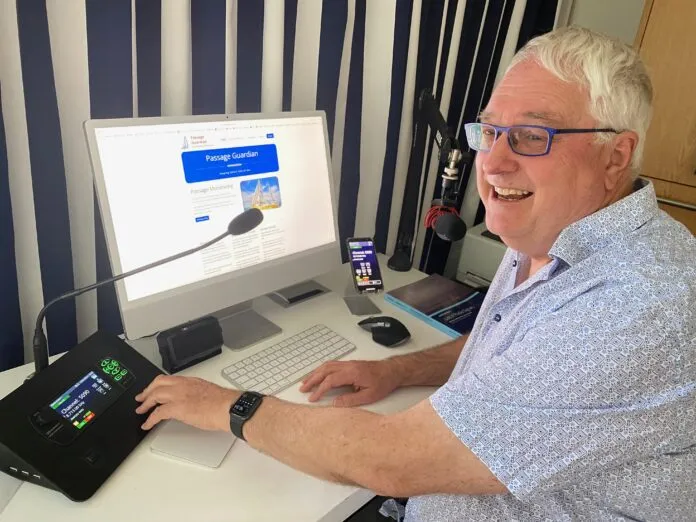
Peter Mott has been working with radio his entire life. But only upon retiring did he start to combine his love of sailing and safety at sea with radio into Passage Guardian.
“It’s fair to say I struggle with the concept of retirement. Someone said to me, ‘Why don’t you keep yourself busy and serve others without any expectation of reward?’” Peter says.
So in 2016 Peter set up the charitable trust Passage Guardian from his home in Russell, on the north island of New Zealand. He has since relocated the charity to Christchurch, on the south island of New Zealand, and continues to offer a global, free-of-charge safety service for recreational vessels conducting ocean passage. He also provides weather information over high-frequency radio, stretching from the Cape of Good Hope to Cape Horn.
At the heart of Passage Guardian’s services is a commitment to leveraging technology for safety. Peter ensures that all vessels under his watchful eye are equipped with transmitting Automatic Identification System (AIS) devices. This allows him to track and monitor their progress and detect any anomalies that may indicate trouble at sea. Coupled with daily reports from sailors, Peter stays informed about the captain and crew’s welfare and course adjustments, offering peace of mind to both sailors and their loved ones ashore.
Describing himself as a retired Internet entrepreneur, Peter’s experience as a radio engineer and private maritime coast station operator stands him in good stead for this current endeavour. He holds New Zealand Boat Master and Coastal Skipper certifications and has sea time on both coastal and ocean passages conducted on his own vessels. Above all else, Peter is a details guy who is passionate about safety at sea.
PROACTIVE APPROACH
“What sets me apart is my ability to intervene early,” Peter explains earnestly. “If a yacht deviates significantly from its course or encounters rough weather, I’m alerted immediately. This proactive approach can make all the difference in a crisis situation.” In a realm where the nearest help could be hours or even days away, early detection and communication are invaluable lifelines. “If it’s only family members who are tracking progress, they may only look at the tracker when it’s convenient to them,” says Peter.
“What I do is incredibly structured,” explains Peter. “I use a range of tools, including satellite AIS, trackers, email and high-frequency radio reporting, to keep a constant watch on yachts that have filed a float plan with me before departure.”
Peter requires each vessel he assists to be fitted with an approved satellite tracker, as well as a website URL for the tracker. In addition, the vessel must be able to send and receive emails at sea and the captain must commit to sending a daily welfare report containing the boat’s position, course and speed, as well as the captain and crew’s general status.
“If I don’t receive the daily welfare report, that’s when I start my missed check-in procedure,” says Peter. “If I suspect the vessel may be in difficulty or will be soon, then I contact the Rescue Coordination Centre (RCC) for the Search and Rescue region being transited, advising there has been a missed check-in. RCC will then decide what action (if any) to take next. I can often tell from the progression of daily email check-ins how much distress they are really in. But I consider a lot of factors when making my assessment, including whether the vessel is single-handed, weather conditions at the time and what’s predicted for the next 24 hours.”
CAMRADERIE FOR CRUISERS
In addition to the tracking and monitoring, Peter provides weather reports and a friendly, experienced voice at the end of a satellite phone. He works with up to 50 vessels at one time and cares deeply about each sailor. “It bothers me intensely if people don’t get home,” he says. “The more we can do to reduce this probability, the better. It’s a big ocean out there, and if something goes wrong, it’s important to know as soon as possible, so that the search is minimized.”
One happy user of Peter’s service is Viki Moore. She is Managing Director of Island Cruising and Down Under Rally, an organization that provides cruising support, education and connection to over 130 vessels in the South Pacific Ocean. She highly values Peter’s work and they have become great friends. “He is always available for me whenever I have any concerns about anyone,” she says. “He is definitely someone you’d want to have on your side when dealing with any major crisis at sea.”
While professing not to be a meteorologist, Peter watches weather systems intensively and says the number of safe weather windows for sailors seems to be reducing. “The extremes of weather we are seeing due to the warming temperatures of the ocean are certainly proving more challenging,” says Peter. “I have one sailor just recently who was waiting a month for a weather window to get from Hawaii to the Pacific Islands, but that window never came, so he’s currently heading back to San Francisco. I’ll track him on his 21-day passage.”
This past year, Peter has been involved in supporting participants of the Ocean Globe Race 2023, the daring endeavour that goes back to the roots of sailing. In this race, where modern navigation aids like GPS and satellite phones are prohibited, Peter’s role becomes even more pivotal. Armed with a high-frequency single-sideband radio, he communicates daily with sailors, providing essential weather updates sourced directly from government forecasts.
“It was a privilege to be part of their journey,” Peter muses, reflecting on the unique challenge posed by the Ocean Globe Race. “Navigating solely by the stars and relying on traditional skills takes some real skill and passion.”
Despite the physical distance, Peter’s voice over the radio is a lifeline connecting sailors with crucial information, bridging the gap between isolation and informed decision-making. “I think the next big event on the calendar for me is the 2026 Golden Globe Challenge. If the sailors ask me to be involved with that, I most certainly will,” says Peter.
While available to all yachts, Peter’s passage monitoring is especially suited to short-handed and solo sailors, in particular circumnavigators. “At the end of the day, the sailor is responsible for his or her vessel, and I’m there to provide additional support when things get difficult.”
Beyond the technical and operational aspects, Peter’s work illustrates a more profound ethos of service without expectation. “I’ve found my purpose in this,” he admits with quiet satisfaction. “To serve others in a way that genuinely makes a difference—that’s the ultimate reward.” His altruistic approach resonates deeply within the sailing community, where camaraderie and mutual aid are not just ideals but everyday practices that ensure the safety and enjoyment of all who venture offshore.
And the community he serves also agrees, with Peter’s service to the ocean cruising community being recognized with an Ocean Cruising Club award at the start of this year. “I feel very privileged,” he says.

One particular sailor who is grateful for Peter’s help is Michael Guggenberger. He and his vessel Nuri placed third in the 2022 Golden Globe—another race where sailors are only dependent on sextant, wind-up clock, paper charts and a high-frequency radio.
“When I got in touch with Peter at around 44°S 120°E I quickly started to like the communication with him,” says Michael. “I enjoyed it daily until 15°S 035°W. He came up exactly on time, very professional, well organized and always polite. Peter added a sense of safety but more important was the companionship that he sends out via radio.”
“The name of his radio station says it all. Passage Guardian Radio ZMH292. He truly guards your passage. The passion of Peter for radios is at the same top level as our passion for sailing. It’s been a bliss to have him on the radio.”
As Peter continues to navigate the intricate currents of maritime safety, his legacy grows not just through technological innovation but through the human connections he fosters. “I may never meet most of the sailors I help,” he acknowledges wistfully. “But knowing that I’ve played a small part in their safe passage—that’s what keeps me going.”
Peter also shares his knowledge with others and enjoys the educational side of his work. “I share my knowledge via ad hoc emails, but also via my website and various speaking engagements,” he says.
When asked how and when Peter takes a holiday himself, he modestly responds that he just takes his work with him. “It’s a quiet time at the moment, but come October, cruisers will be coming back to New Zealand and Australia from the Pacific, so I’ll be back to it then.”
In an age where satellite communications and smart technology lessen the distances between us, the human element remains irreplaceable. Passage Guardian plays an indispensable role in the modern cruising experience. For more information visit about Peter’s service, visit passageguardian.nz.













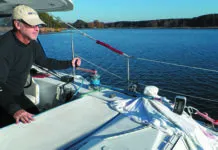









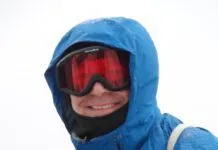
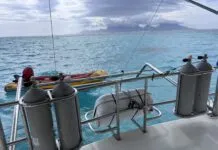
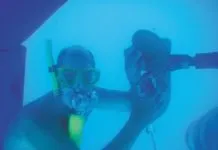










I had an adopted Uncle here in Destin Florida who kept in daily touch with the fishing fleet here (in the 1960s-1970s before modern conveniences) via CB radio and a 30 meter tower to warn them of impending weather, etc. He did this as a service also and was greatly appreciated by the community. Good on ya Peter! Theodore Sumrall